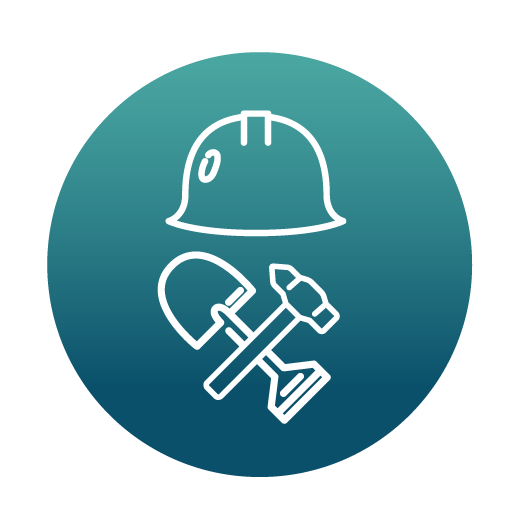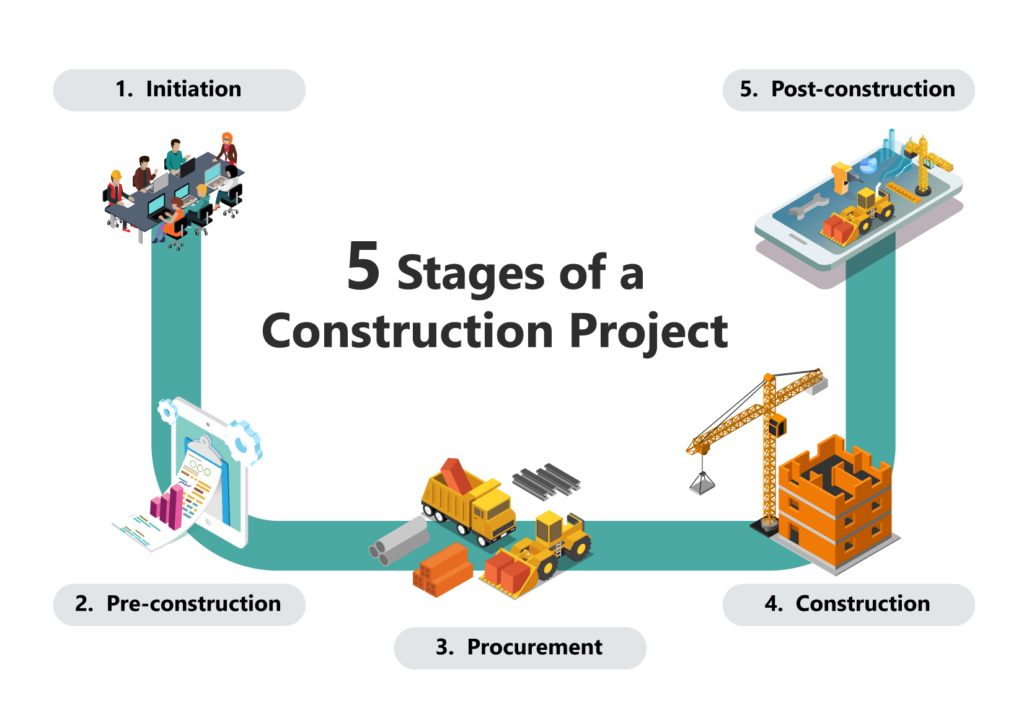

Use Cases in Construction
We’ve uncovered 10 construction use cases where applying one or more technologies can help solve a construction-related problem. Learn more.
Download the EbookConstruction projects can be complex, with various materials to procure, schedules to coordinate, budgets and timelines to maintain, contracts to manage, and expectations to meet. You can then multiply that complexity across however many projects a construction firm has underway at any given point in time.
In order to keep each of these projects on track and on budget, firms need to create comprehensive plans that account for many possible contingencies, then hold their teams to those plans. Project management supports this goal by defining the resources needed to successfully complete a construction project — including personnel, materials, tools, and processes — and ensuring those needs are met.
What Is Construction Project Management?
Before we can begin to discuss project management in a construction-specific context, we need to cover some basics.
Project management refers to the discipline of managing the entire lifecycle of a project, from scoping a project and determining what resources are needed to support it to executing the project plan and managing various resources and deliverables.
As their title implies, project managers — sometimes known as project leads or project supervisors — are responsible for spearheading project management. Project managers often face an uphill battle, as they’re expected to see projects over the finish line while working within certain parameters, such as scheduling and budgetary constraints. Project management and project managers are a common feature in every industry, from advertising and financial services to healthcare and information technology.
The expectations for construction project management aren’t all that different from those for project management in any other industry: Project managers must procure materials, manage resources, set schedules, assess risk, work within constraints, and ensure the successful completion of projects they oversee. However, the day-to-day responsibilities of a project manager in the construction industry are unique.
On any given day, a construction project manager might:
- Estimate and negotiate project costs
- Review project drawings and site conditions
- Coordinate with architects, project owners, contractors, subcontractors, and engineers
- Conduct daily check-ins with construction crews to gauge project progress
- Ensure compliance with the Occupational Safety and Health Administration (OSHA) and other safety standards
- Log safety issues and generate safety reports
- And more
As you can see, managing a construction project is no simple feat and requires not only a skilled workforce but also the right tools and software to support them.
Who’s Who on Your Construction Project Management Team
Although a project manager is the point person on any construction project, they’re far from the only member of a construction project management team. Other essential team members include:

- Project Owner: Any natural person, legal entity, or public institution that commissions a construction project is known as a project owner. The project owner is responsible for financing the project and retaining the services of third-party providers such as engineers, architects, contractors, and project managers. Although the project manager is responsible for organizing and overseeing day-to-day operations for construction projects, as the chief stakeholder, the project owner makes all final decisions on budget, scope, and project delivery method.

- General Contractor: The general contractor for a construction project is responsible for overseeing operations at a job site. This generally entails hiring and supervising subcontractors, applying for building permits and licenses, managing construction crews, and communicating project updates to both the project manager and the project owner. Depending on the scale of the project, a project manager may work with multiple general contractors, one for each construction site.

- Subcontractors: A subcontractor is an individual or a business that agrees to carry out work on behalf of a contractor. Given the complexity of construction projects, general contracts aren’t always able to fulfill all roles singlehandedly; additionally, some tasks require specialized skills to complete. In order to meet these needs, general contractors will often hire subcontractors for support. Although subcontractors typically do not have direct contact with the project manager, they still play an essential role in construction project management.

- Construction Crew: The construction crew consists of the various laborers who work on a construction site and whose job responsibilities may include operating heavy machinery and equipment, loading and unloading materials, erecting scaffolding, and so on. There are typically specialized roles within a construction crew, such as a foreman, who leads the crew, and a maintenance person, who ensures that the rest of the crew has everything they need to work and maintains a clean working environment.

- Construction Estimator: A construction estimator works closely with the project manager to determine the expected cost of a construction project based on the necessary equipment, materials, and personnel. This estimate then informs the overall project budget. Some construction firms have a team of in-house estimators, while others are subcontractors hired by the general contractor.

- Architect: One of the most essential roles on any construction project management team, the architect is responsible for the design of new projects. Architects focus not only on creating design drawings, but also on more technical matters, such as building codes, accessibility considerations, energy-saving features, and so on. Architects also seek bids from builders, obtain permits, and work closely with the project manager during construction to ensure that the project owner’s needs are met.

- Engineer: A construction engineer — also known as a civil engineer — helps bring architects’ designs to life by creating blueprints, working with the project manager and construction estimator to develop a budget for projects, selecting quality materials, and helping supervise job site operations.
The 5 Stages of a Construction Project
Although each construction project is unique and the details may vary, they typically include the following stages:
- Initiation: In this first phase of a construction project, key stakeholders meet to discuss the need for the project, set goals and objectives, and conduct feasibility testing. From there, these key stakeholders begin to develop a plan for the project and draft early designs. The project manager will create a project initiation document based on these conversations, which will detail the scope, budget, potential risks, and success criteria and will serve as the foundation for the project. At this point in the process, the project owner will also start to seek bids from general contractors.
- Pre-construction: Once the project owner has reviewed bids and selected a general contractor — or several, depending on the scope and scale of the project — other key stakeholders, including the project manager, will begin to prep the job site for construction and finalize the budget, design, and timeline for the project.
This stage of the process typically involves a lot of paperwork in the form of permits, blueprints, and project plans, so it’s important for construction project management team members to have a centralized way to store and access documents. Scheduling software is also essential, as project managers will begin to set schedules in accordance with team member availability and project timelines and therefore require a holistic view of personnel resources. - Procurement: During the procurement stage, construction project team members will begin to source, purchase, transport, and assemble the materials necessary for the project. Shipment delays due to supply chain volatility are a common issue at this stage, so stakeholders must assess potential points of failure when selecting suppliers and develop contingency plans. It’s also important that all stakeholders have access to the most up-to-date information and have the ability to communicate and share documents in real-time to ensure that procurement stays firmly within budget.
- Construction: With all of the necessary pieces in place, general contractors, subcontractors, and crew members are ready to get to work. Project managers and other construction project management team members may also visit the job site(s) to ensure that everything is going according to plan. At this stage of the process, clear communication, easy access to the project documentation, accurate scheduling, and detailed timekeeping are of the utmost importance.
- Post-construction: Once work on a construction project is complete, the project manager must orchestrate closeout, which typically entails returning equipment rentals, cleaning up job sites, and ensuring personnel is paid. The project manager may also call key stakeholders together for a post-mortem meeting, during which they’ll review which objectives were met and which ones weren’t, see the final project budget, and determine whether there are any outstanding tasks that need to be completed.

Common Challenges to Project Management in Construction
For all its rewards, construction project management can be a difficult job. Here are some of the most common challenges project managers face — and how they can solve them:
- Poorly Defined Goals: In order to be successful, project managers require clearly defined goals from key stakeholders upon which to execute. Project managers should advocate for both themselves and the needs of the project by asking questions early and often and working closely with stakeholders to clarify goals and expectations. In doing so, they can help lock in the scope of the project, reducing the risk of delays or budgetary overages.
- Lack of Accountability: Without a clear understanding of which role is responsible for what, a construction project can quickly go off the rails. Project managers can solve this by working with key stakeholders to define and assign roles and responsibilities during the initiation stage of the project and by using timekeeping and mobile applications during the construction stage to stay on top of subcontractors and crew.
- Inaccurate Estimates: An inaccurate timeline or budgetary estimate can quickly lead to a construction project exceeding its scope, jeopardizing project completion and a firm’s profitability. Custom dashboards can help project managers gain a holistic view of project resources, enabling them to proactively identify inaccuracies, while analytics and forecasting tools enable them to determine project needs.
- Siloed Data: Data silos can pose a real risk to construction projects because they prevent construction project management teams from sharing mission-critical information, getting a complete picture of the project, and collaborating. In order to solve this, firms should ensure that all software systems are tightly integrated and that all project information is securely stored in a centralized location.
- Lack of Access to Real-Time Data: Closely related to the previous item, a lack of access to real-time data can impede risk management. Without a clear view of both actual and potential risks, project managers may not be able to develop viable contingency plans, which could lead to safety risks, project delays, and other costly issues. An enterprise resource planning system can lend project managers the insight they need to ensure that construction projects stay the course.
- Poor Productivity: The construction industry faces a serious productivity issue, especially as the needs of projects grow more complex over time. Although there’s no one quick fix for this problem, construction project management teams can improve productivity by using real-time collaboration tools, as well as investing in automation for project services.
Find the Right Project Management Software for Your Construction Company
Make construction project management easier by investing in tools and technology purpose-built for the construction industry. From team collaboration and financial forecasting to automated timekeeping and resource scheduling, Hitachi Solutions delivers a wide range of offerings — including project management software — built on the Microsoft platform and designed to support the needs of the construction industry.
Empower your construction project management team — contact us today to learn more.


